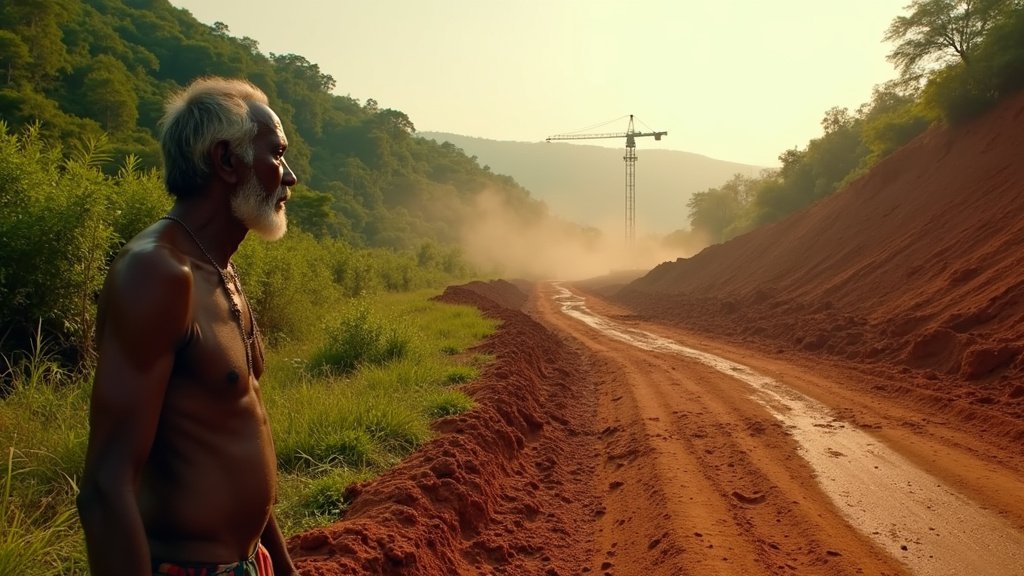A somber shadow has fallen over Montego Bay Gardens, Portobello, Jamaica, where residents of the revered Rastafari Indigenous Village describe the current situation as a profound “Time of Trial.” Extensive construction activities along the vital access road to this sacred community have wrought devastating damage, effectively severing a lifeline and threatening the very essence of a vibrant cultural heritage. The unfolding crisis has garnered significant news attention, raising alarm bells about the balance between national development and the preservation of indigenous identity.
A Sacred Sanctuary Under Siege
The heart of the issue lies with construction efforts undertaken by the China Harbour Engineering Company (CHEC). What was intended, presumably, as infrastructural improvement has instead resulted in widespread environmental degradation and the desecration of a culturally significant landscape. The damage is stark and irreversible: rampant deforestation has stripped the verdant surroundings bare, while drastic changes to the land’s contours have irrevocably altered the natural topography. These interventions are not merely aesthetic; they are foundational assaults on an environment integral to Rastafari spiritual and communal life.
The physical destruction extends directly to accessibility. The primary access road to the Rastafari Indigenous Village has been rendered so challenging that the community now finds itself effectively closed off. For a village whose existence relies on connection – to its adherents, to visitors seeking cultural immersion, and to essential supplies – this isolation presents an existential threat. The difficulty in navigating the damaged terrain means that basic needs, cultural exchange, and the daily rhythm of life have been severely disrupted, cementing the residents’ lament of being in a “Time of Trial.” The very idea of an accessible haven has become a poignant memory.
Erosion of Identity and Heritage
Beyond the immediate physical damage, the deeper, more insidious consequence of this construction is the profound destruction of cultural heritage. The Rastafari Indigenous Village is not merely a collection of dwellings; it is a living testament to the history, spirituality, and enduring identity of Rastafarians in Jamaica. It serves as a vital repository of knowledge, traditions, and communal practices. Its sanctity, built over generations, has been violated, leading to an undeniable sense of loss.
This desecration casts a wide net, impacting not only the Rastafarian community but also contributing to a broader loss of identity for Jamaicans as a whole. The Rastafari movement, born out of the island’s unique socio-political landscape, is an integral thread in the fabric of Jamaican national identity. The disregard shown for a site of such profound cultural importance sends a chilling message about the value placed on indigenous traditions and the delicate balance between progress and preservation. The significance of this particular headline extends far beyond local concerns, resonating with global discussions on indigenous rights and cultural safeguarding.
The Echoes of a ‘Time of Trial’
Residents’ description of the situation as a “Time of Trial” encapsulates the anguish, resilience, and uncertain future facing the community. It speaks to a period of intense challenge, a test of faith and endurance in the face of overwhelming external forces. This phrase, deeply rooted in Rastafari spiritual lexicon, emphasizes the gravity of the assault – it is not just land that has been damaged, but a way of life, a spiritual connection, and a cultural legacy.
The plight facing the village, a story that first came to public light on July 28, 2025, and gained broader dissemination by August 16, 2025, highlights a profound cultural assault. It serves as a stark reminder of the potential friction when large-scale development projects proceed without adequate respect for, or understanding of, local cultural and historical landscapes. For a nation like Jamaica, where cultural tourism and the celebration of unique heritage are cornerstones, such incidents pose a significant threat to its very character and international standing. The situation has become a critical headline for cultural preservationists globally.
A Call for Reckoning and Restoration
The unfolding tragedy at the Rastafari Indigenous Village demands urgent attention and a comprehensive reassessment of development practices within culturally sensitive zones. The irreversible damage already inflicted underscores the imperative for accountability and, more critically, for meaningful efforts towards restoration, both environmental and cultural. The spiritual and communal integrity of the village, a beacon for Rastafari heritage, hangs precariously in the balance.
The “Time of Trial” for the Rastafari community in Portobello is a vivid and painful illustration of the ongoing global struggle to protect indigenous lands and cultural identities from the relentless march of often unsympathetic development. It is a powerful call to action for all stakeholders – government, corporations, and civil society – to ensure that the pursuit of progress never comes at the irreparable cost of a people’s soul and a nation’s heritage.

